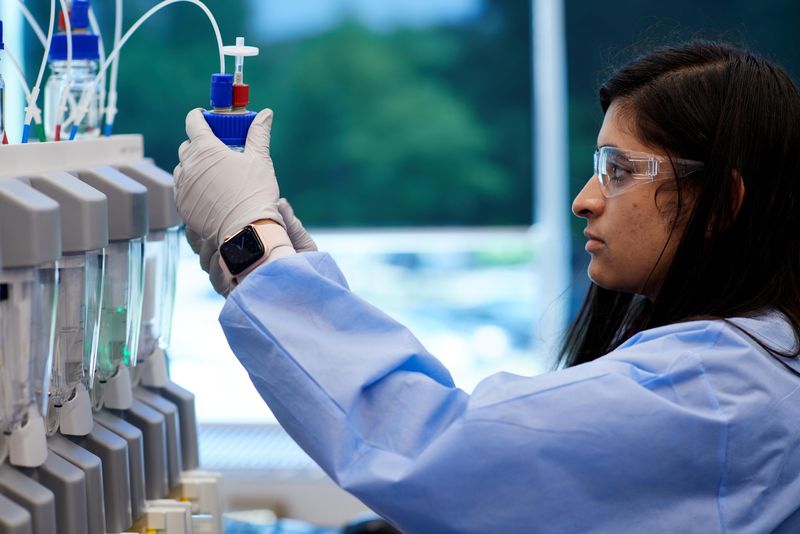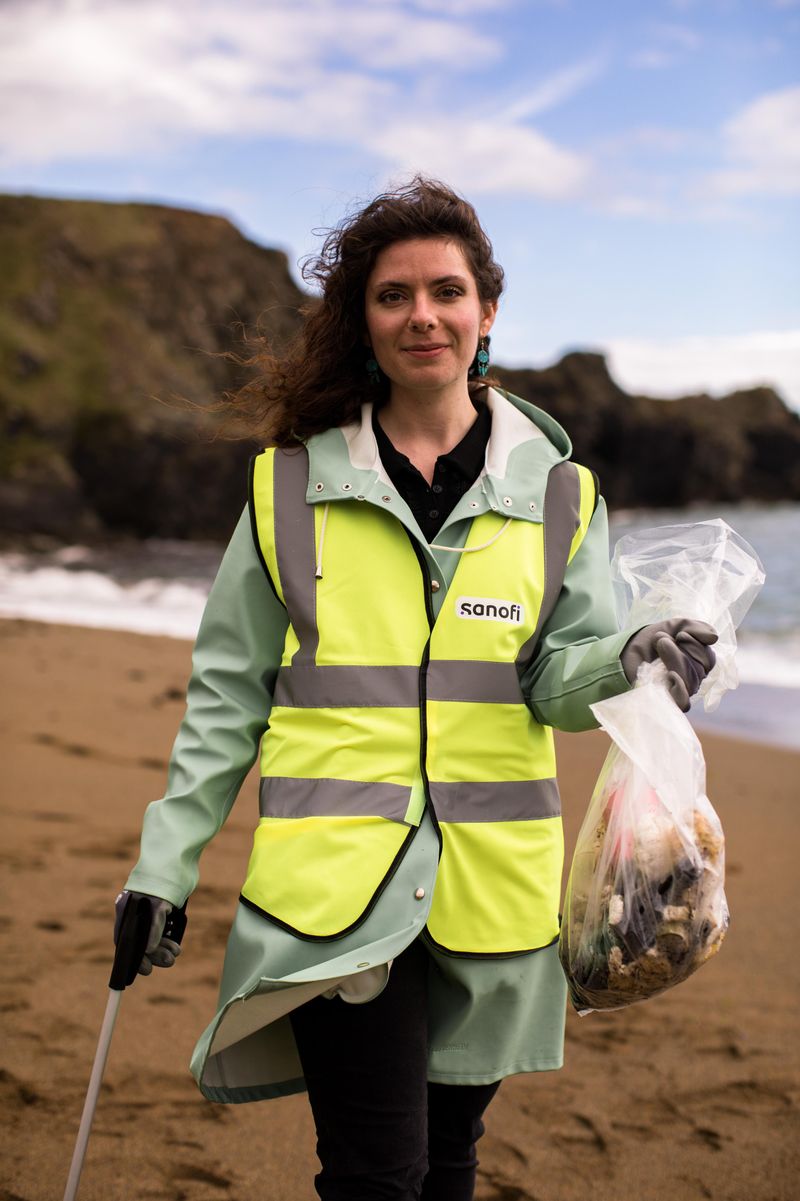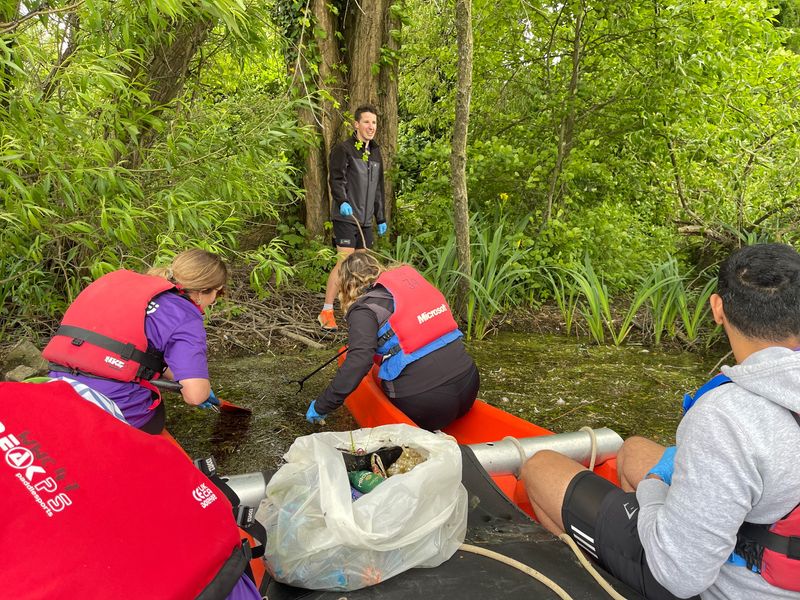Climate change is estimated to cause a quarter of a million deaths each year worldwide by 2030-2050.1 It presents a pressing threat to global health, with rising temperatures increasing hospital admissions, undermining efforts to eradicate infectious diseases and exacerbating cardiovascular and respiratory illnesses.2 The healthcare sector generates almost 5% of global greenhouse gas emissions – if it were a country, it would be the fifth-largest polluter on Earth.3
Collective action is needed

Government and policymakers
Make decarbonisation a priority, e.g., through preventative
care, investing in innovation to reduce environmental impact
and healthcare professional education4

Healthcare professionals
Conduct virtual consultations where possible to lower travel and reduce emissions, work with patients to manage conditions and reduce complications (which can lead to increased carbon emissions)4,5

Patients
Be empowered to explore and align on ‘greener’ care options with healthcare professionals4

Pharma, biopharma, and med-tech
Reduce carbon emissions and environmental impacts associated with development, manufacturing, supply, and product lifecycle4
How Sanofi is building a sustainable environment
Recognising our responsibility, our global actions run on three parallel tracks:

Achieve carbon neutrality by 2030 and net zero emissions by 2045
Reduce Greenhouse Gas (GHG) emissions
Source renewable electricity
Foster an eco-fleet

Limit environmental footprint and adopt circular solutions
Preserve natural resources
Reduce environmental footprint
Protect and foster biodiversity on sites

Improve environmental profile of products
Evaluate impacts of medicines
Eco-design products
Promote responsible use and proper disposal of unused medicines, medical devices, and packaging
At COP26, Sanofi joined the Sustainable Markets Initiative (SMI) Health Systems Task Force working with other companies as well as global and public institutions such as UNICEF or WHO.6 Within this initiative, Sanofi is leading the “patient care pathway decarbonization” working group.
Our UK goals align with those of Sanofi global and the UN's Sustainable Development Goals

Obtain international standard (ISO) certifications for the management of environmental and energy systems within our Reading office

Reduce indirectly caused (scope 3) emissions by decarbonising our supply chain and reviewing business travel

Install solar panels at our Reading headquarters, offsetting emissions by 9.1% and avoiding 12,357 kg of emissions annually

Reduce food waste by half in our offices and optimise our heating, ventilation, and air-conditioning operation times
These goals are also aligned with the NHS, the first health service in the world to announce a plan to become a net zero carbon health system by 2045.7 As an NHS supplier, we take our commitment to supporting these goals very seriously.
What we’ve achieved so far in the UK
We reduced our carbon emissions by 34.8% between 2019-22, by:

Consolidating our UK offices into one site and reducing employee time in the office by half

Installing motion sensors and non-occupancy timers to save energy

84% of our Sanofi car fleet are now hybrids

Our headquarters are now entirely powered by renewable energy, are plastic free and all waste is recycled or turned into biofuel
Our UK ‘We Mean Green’ team empowers and educates our Sanofians

Act as internal ambassadors to support the company’s green strategy

Support planning of company events to ensure sustainable practices are in place

Organise awareness days and local activities such as river cleaning, litter picking and recycling schemes.
Case study: Diabetes and sustainability
The application of sustainability initiatives is highly relevant to diabetes.
Preventing the occurrence of complications (such as chronic kidney disease or cardiovascular disease) in diabetes can have a significant impact on both patient outcomes and carbon emissions. For example, the carbon emissions related to the care of a patient with diabetes who has late-stage kidney disease are about 70 times higher than for a patient whose diabetes is controlled.4
In addition, the disposable components of insulin injection pens can bring negative environmental impact. The challenge the industry faces is to reduce this impact and increase the use of recyclable materials, without adversely affecting patient experience, device performance, or cost.8,9
How is Sanofi improving the sustainability of diabetes management?
Sanofi is undertaking a lifecycle assessment on all medicines and medical devices as well as supporting programmes to collect unused medications. Our aim is to minimise the environmental footprint of our products along their entire value chain from manufacturing to end-of-life, via packaging and distribution to deliver eco-innovative products to patients.
We are working to reduce wastage and increase yield in insulin production by using highly selective enzymes, increasing the final insulin yield by 50% and so reducing the future number of batches per year, saving 2.000 m3 purified water, 22t of raw materials, and 61t CO2 per batch.10
We’re planning several pilot projects to support sustainable use and responsible disposal of insulin devices across Europe. We intend to scale this up in different countries and for all disposable devices.
We are also pioneering the world's first cross-industry solution for recycling injection pen materials, together with other pharmaceutical companies. The aim of our pilot is for 25% of all injection pens distributed by the four companies in Denmark to be recycled within the first year, avoiding use of more than 25 tonnes of plastic.11
In April 2023, we also launched our new ‘Green Award’, which celebrates teams, organisations and individuals who have led a diabetes project which has helped reduce carbon emissions.
Sanofi is recognised
as leading in sustainability amongst global companies by minimising our impact on the planet - but we must do more, and we are committed to continue finding sustainable solutions. Sanofi was in 2022 recognised as one of the most sustainability-committed companies in an ESG Evaluation (Environment, Social, Governance) performed by Standard & Poor’s Global Ratings (S&P).12
References
- World Health Organization (n.d) Climate Change. Available at https://www.who.int/health-topics/climate-change#tab=tab_1. Last accessed March 2024.
- Romanello M, McGushin A, Di Napoli C, et al. The 2021 report of the Lancet Countdown on health and climate change: code red for a healthy future. Lancet. 2021;398(10311):1619-1662. doi:10.1016/S0140-6736(21)01787-6
- Health Care Without Harm (2019) Health care climate footprint report. Available at https://noharm-global.org/documents/health-care-climate-footprint-report. Last accessed March 2024.
- Sustainable Markets Initiative (2022) Decarbonising Patient Care Pathways, a report by the Sustainable Markets Initiative Health Systems Taskforce in collaboration with BCG. Available at: https://a.storyblok.com/f/109506/x/88fe7ea368/smi-hstf-pcp-whitepaper.pdf. Last accessed March 2024.
- Fordham R, Dhatariya K, Stancliffe R, et al. (2020) Effective diabetes complication management is a step toward a carbon-efficient planet: an economic modeling study. BMJ Open Diab Res Care 2020;8:e001017. doi:10.1136/ bmjdrc-2019-001017
- Sanofi (2022) Planet and Health Resilience. Available at https://www.sanofi.com/assets/dotcom/content-app/documents/Climate-change-and-Health-2.pdf. Last accessed March 2024.
- NHS (2022) Delivering a ‘Net Zero’ National Health Service. Available at https://www.england.nhs.uk/greenernhs/a-net-zero-nhs/. Last accessed March 2024.
- Klonoff, D. C., Heinemann, L., Cook, C. B., Thompson, B. M., Kerr, D., Han, J., & Krisiunas, E. P. (2020). The Diabetes Technology Society Green Diabetes Initiative. Journal of diabetes science and technology, 14(3), 507–512. https://doi.org/10.1177/1932296820904175. Last accessed March 2024.
- Greener, M. (2023), The greening of diabetes. Pract Diab, 40: 8-10. https://doi.org/10.1002/pdi.2442
- ABPI (2022) Cymru Wales Winter Bulletin – Sustainability https://www.abpi.org.uk/publications/abpi-cymru-wales-winter-bulletin-2022-sustainability/. Last accessed March 2024.
- Karlsson, C (2023) Novo Nordisk teams up with rivals to recycle injection pens in Denmark, MedWatch. Available at https://medwatch.com/News/Pharma___Biotech/article15680063.ece. Last accessed Macrh 2024.
- Sanofi (2022) Sanofi recognized by S&P as one of the most sustainability-committed companies - Sanofi Press Release. Available at https://www.sanofi.com/en/media-room/press-releases/2022/2022-03-08-13-25-40-2398922. Last accessed March 2024.
MAT-XU-2305579 (v1.0)
March 2024
